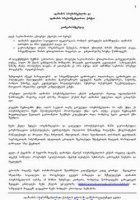

Início
A questionnaire: a tool for a first inventory on responsibilities in Georgia
The plan was to work out a questionnaire tailored to the situation in Georgia, then to identify target groups and find out what people think about responsibility and being responsible. Using the European version of the questionnaire and other documents and through brainstorming, the list of questions for the Georgian questionnaire was developed. Finally the target groups and regions were identified. Taking into account peculiarities of some regions of Georgia with multinational population, a Russian version of the questionnaire was prepared along with the Georgian one. The first version of the questionnaire has been tested by Julia Kharashvili, with a group of IDP "young leaders" (Internal Displaced Persons). Based on this experience and comments the questions were reworked.
Volunteers for the project were invited. The meeting was organized to brief them on the methods of interviewing and principles of the Charter. The main principles were presented and discussed. The teams went to the different regions in July.
In August the first elements came from the interviews we have carried out, in various professional and social sectors: students, scientists (political and social science), teachers, artists and journalists. The interviews were carried out in 7 regions of Georgia. Since summer is not the best time to reach people, especially the groups such as teachers and student, our initial plan to complete the interviewing process by the end of September has not been a complete success. Between beginning June to end September 2006, we have interviewed approximately 90 people. At the moment we are in the process of analysing the data. From now to the end of the year, we will have transcribed the results of some 50 additional interviews.
First results
Reviewing the data available so far, we have noted that all persons interviewed, despite their professional or socials background, found the Charter project interesting and quite necessary. Many respondents mention that they never reflect about responsibility, but being responsible has always been a strong notion for Georgians. In most of the cases people do not consider responsibility as a burden, but they feel more responsibility with regards to family, friends and relatives rather than for global changes.
Most of the respondents think that at the moment the Charter cannot be adopted as a law, since community is not ready for that. They consider that it would be unrealistic and ineffective to try - at this precise moment - to make the Charter become a “third pillar” of the international life. Most of the persons interviewed speak about the necessity of a personal change, as a condition for a social change. If the Charter is used to make people become sensitive and to stimulate the consciences the socially responsible action will then become more effective. General opinion, mostly of adults, is that the text should serve to raise awareness and educate young people so to make them more responsible in the daily lives.
Lessons learned for next step
So far our research is so restricted that we cannot claim that these first results are representative of the social representations on the notion of responsibility in Georgia. Nevertheless, these results give us some indications that help us specifying the next stages in our project. We think of concentrating our work in priority on using the Charter as a tool for making people sensitive and aware. In particular, we will try:
1. To make people become sensitive on the concept of responsibility, by creating the adequate educational tools:
![]() posters and leaflets for kindergartens and schools
posters and leaflets for kindergartens and schools
![]() discussions, leaflets and the text of the Charter itself at universities and high schools
discussions, leaflets and the text of the Charter itself at universities and high schools
![]() through the socially responsible initiatives (clean up the world, ecological footprints, etc)
through the socially responsible initiatives (clean up the world, ecological footprints, etc)
![]() through linking the initiatives of the group with allies pursuing goals that are similar to ours
through linking the initiatives of the group with allies pursuing goals that are similar to ours
![]() through setting up a Georgian website, as an up-to-date powerful educational tool.
through setting up a Georgian website, as an up-to-date powerful educational tool.
2. To diffuse the Charter and the information on the international project of the Charter to professional groups that can play the role of educational agents and information multipliers: teachers, leaders, trainers, journalists, persons in charge for communication within public or private organizations.


